'He's a Christian man': Eric Nshimiye's family relies on deep faith amid genocide claims
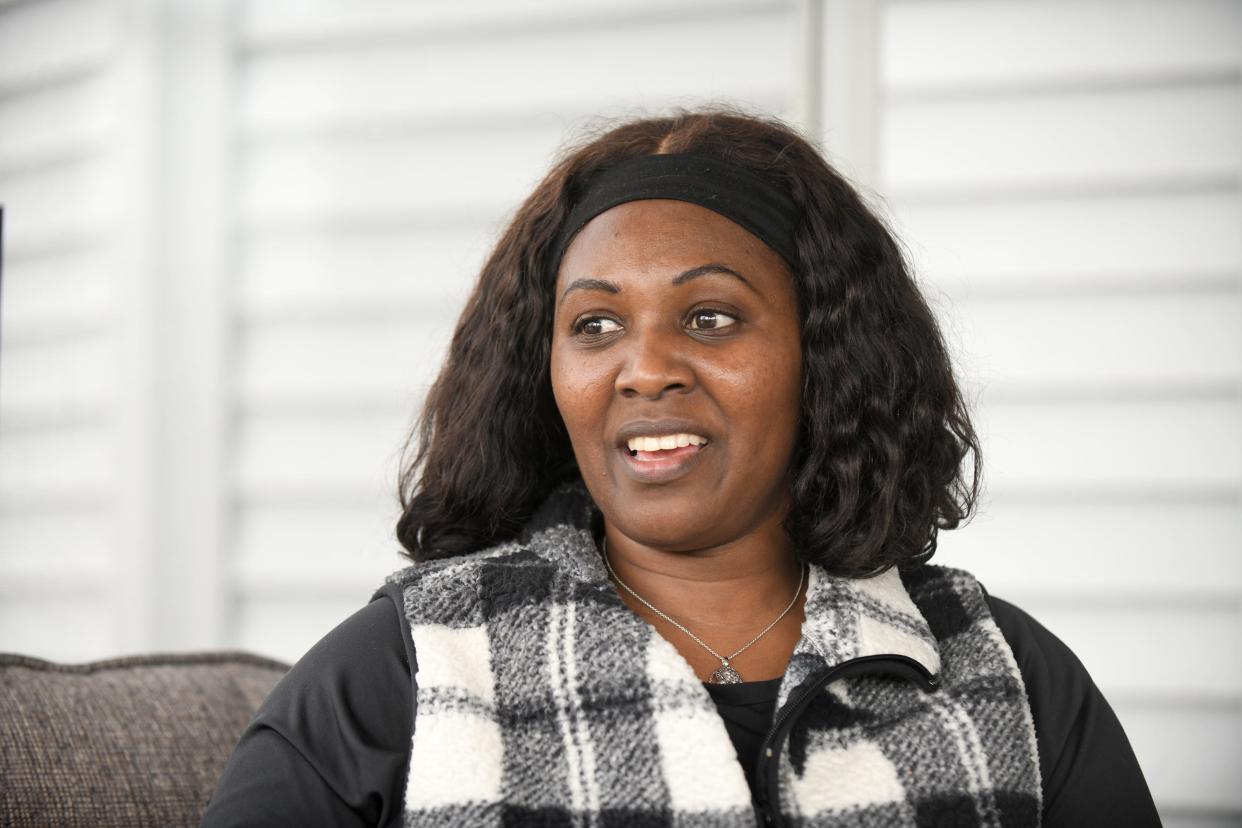
LAKE TWP. ‒ The patriarch of the Nshimiye family is absent.
Not like the times he was on the road for work. He'd sometimes traveled to far-flung locations as an engineer for Akron's Goodyear Tire & Rubber during the past 23 years. The family got used to those trips. And they knew Eric Nshimiye would come back home.
This time is different.
No one can say when, or if, the 53-year-old husband and father of four will return to their 1,232-square-foot, three-bedroom split level in The Boroughs allotment near the Uniontown area.
Federal authorities showed up after he walked out of his house at about 7 a.m. for his daily commute on March 21, a Thursday. They arrested him on a warrant issued in Boston. They took him to a jail in Youngstown. His wife, Chantal Nshimiye, said agents wouldn't even allow her to say goodbye to her husband.
"They handed me his belt, his wallet, his (Goodyear) badge," she recalled.
Nshimiye is charged with nine counts of three separate crimes — all related to alleged lies told and secrets kept for nearly 30 years. The foundation of the charges: he's accused of raping and killing innocents in his homeland of Rwanda in 1994.
Prosecutors say he hid his past to begin a new life in America. If he's found guilty, he could eventually be deported to the east-central African country to stand trial for crimes he's accused of committing there.
So, no one can guarantee Nshimiye will ever come back home.
No one, except for his family.
They believe — for so many reasons.
Fathers, sons and the Holy Spirit
Chantal Nshimiye believes. So does the couple's son Nestor, a student at Duke University. Same for their daughters, Tiffany, a North Canton Hoover High senior, and Destiny, an eighth grader at North Canton Middle School.
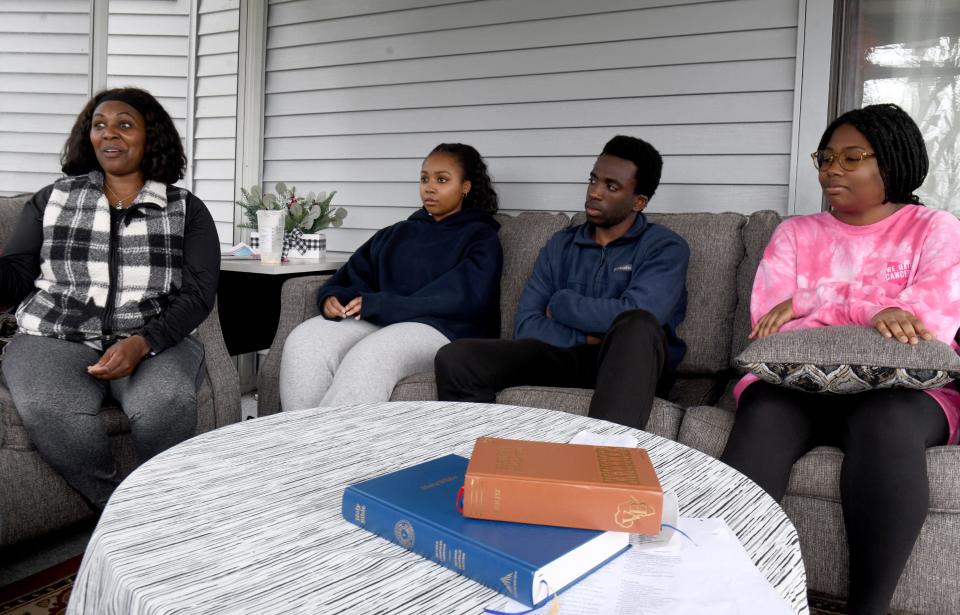
"I'm confident he will come back home," said Chantal Nshimiye, who credits her family for helping teach her to speak English, though she still carries an African accent.
All four recently spoke to The Canton Repository for this story. The only one missing was Tresor, the oldest son. He's studying in a Texas seminary to be a priest.
"They've destroyed (Eric's) life ... and his childrens' lives," Chantal Nshimiye said.
Still, she said, the family hasn't cried.
They're not angry.
The collective calm, she said, is rooted in belief. They believe in the American justice system. They believe in their husband and father. They also believe in God the father, Jesus the son, and the Holy Spirit. They believe that trinity, the staple of Catholic faith, watches over them — that there is a long-term purpose in all of this.
"True justice comes from heaven," Chantal Nshimiye said.
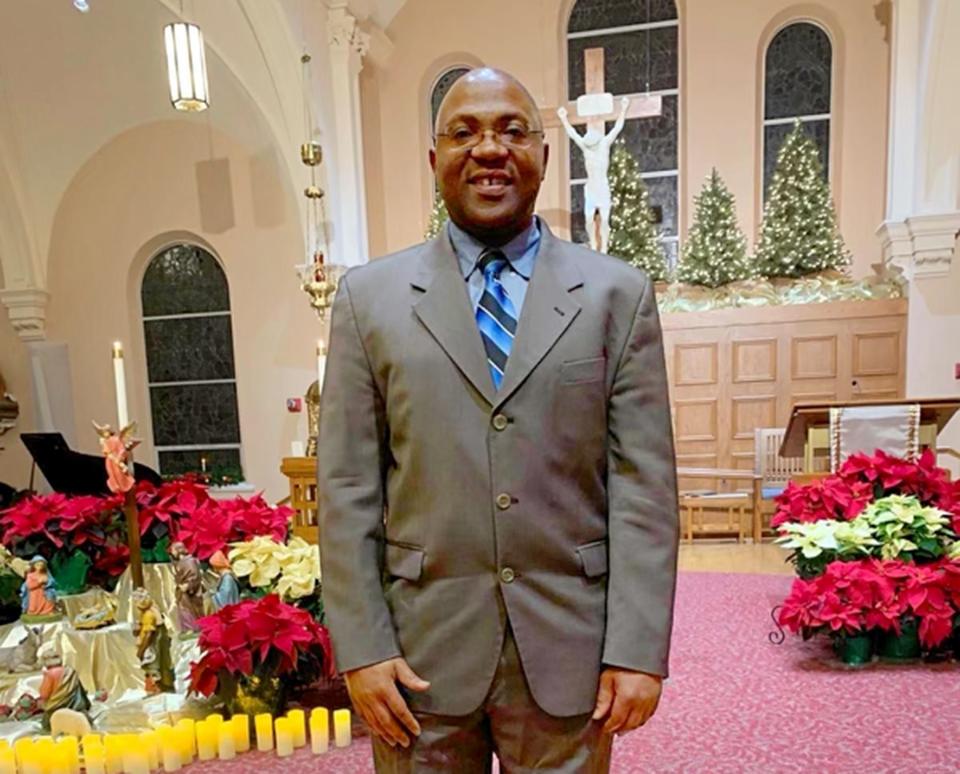
Their faith is a deep part of who they are. It's been that way for all 22 years of her marriage, Chantal Nshimiye said.
"This house is blessed," she said.
The Nshimiyes are longtime members of St. Paul Catholic Church in North Canton. Chantal Nshimiye visits Queen of Heaven Catholic Church in Green daily for a 20-minute rosary prayer prior to mass. The family has more Bibles than they can count. And they rely upon lists of prayers Eric Nshimiye compiled over the years for the family at home.
Chantal Nshimiye said she met her husband in 2000 in Dayton; they married a year later. She said they lived in Akron for a bit and later bought the home in Lake Township in 2003.
"He's a Christian man .... like an angel God sent to me," she said.
So many neighbors and friends have been to the Nshimiye house through the years. Eric Nshimiye helped neighbors. Children played on his lawn. A pair of soccer goals still stand in the side yard. Tiffany Nshimiye said her friends are on her side.
"They know him," she said.
Son Nestor Nshimiye said it's frustrating.
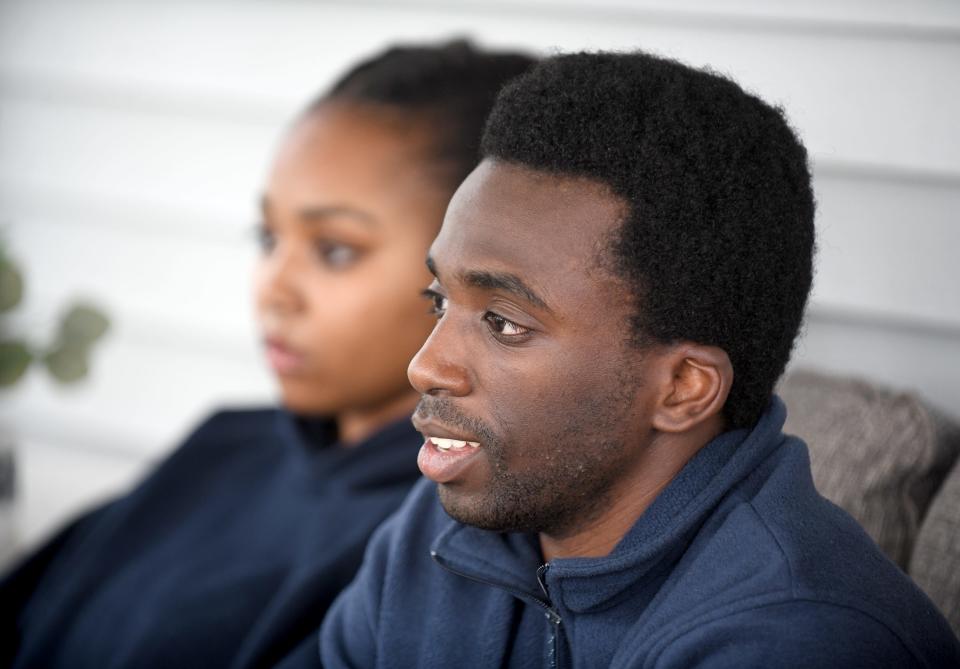
"We all know of our dad's innocence," he said. "But it's completely out of our hands. They think that he's a murderer ... but we have nothing to hide."
Chantal Nshimiye said she was disappointed her husband was denied bond at his most recent appearance in U.S. District Court in Youngstown.
However, she said it was no coincidence the hearing was held at 3 p.m. March 29, which was Good Friday. Christians believe that's the time and day Jesus died on the cross.
She has spoken to her husband by phone.
"He said, 'If you feel OK, I feel OK; I have inner peace,'" she recalled.
Eric's alibi is a giant lie, authorities say
Eric Nshimiye — along with extended family and friends in the Rwandan community around the world ― look forward to their future days in court in Boston, the family said.
It's where a federal grand jury indicted him on four counts of perjury, and one count each of obstructing justice; aiding and abetting and falsifying, concealing and covering up a material fact.
Nshimiye is accused of lying about his past when he fled Rwanda during the 1994 genocide. The bulk of the country's 6.7 million population at that time belonged to an ethnic group known as Hutus, while another group, the Tutsis, were a minority.
It's been widely reported that as many as 800,000 Tutsis were killed during a 100-day frenzy that erupted after a plane carrying Rwandan President Juvénal Habyarimana and Cyprien Ntaryamira, the Hutu president of Burundi, was shot down.

Eric Nshimiye, a Hutu, was a medical student at the National University of Rwanda Butare campus at that time. His roommate, classmate and friend was fellow medical student Jean Leonard Teganya.
Teganya was convicted in Boston federal court in 2019 for some of the same type of immigration and genocide-related criminal charges Nshimiye now faces. Nshimiye's decision to testify on behalf of his old friend five years ago is probably why Homeland Security agents began to investigate him, his family said.
"My dad stepped up," Nestor Nshimiye said.
"He was being a good Christian," Chantal Nshimiye said.
In court documents from Teganya's case, and Nshimiye's case now, the two men are accused of essentially the same thing.
It's alleged Nshimiye lied — about dates, facts and his past — on a series of successive immigration documents. Prosecutors say he repeated those lies on the witness stand during Teganya's trial.
According to court records, and family, Nshimiye said he was in Kigali, Rwanda, when the genocide began.
He'd said he was on a two-week break from studies in Butare. He said he attempted to return to Butare, but the chaos and roadblocks forced him to return to Kigali. Ultimately, he said, he went to Ruhengeri, where his family, including his mom, lived.
From there, Nshimiye testified in 2019, he fled to the Congo, then Kenya, before coming to the U.S. in December 1995. He earned a degree from the University of Dayton, met his future wife, married and moved to Northeast Ohio to live happily ever after.
That, in a nutshell, is his alibi.
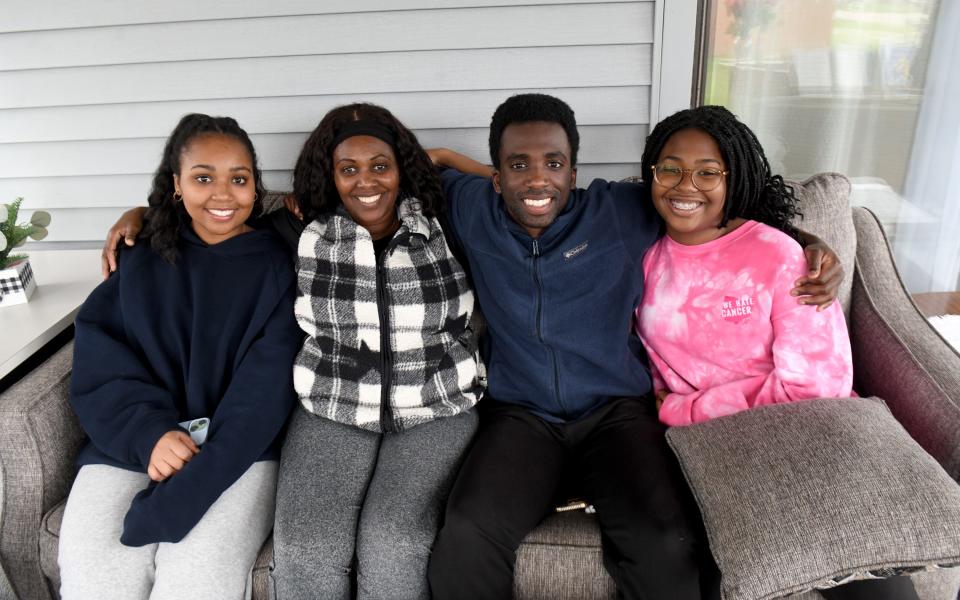
Prosecutors say it's a far more sinister story.
They say Nshimiye was in Butare during the genocide, continuing to study and working in the hospital there. Prosecutors allege he was a member of the National Revolutionary Movement for Development and a violent youth piece known as the Interahamwe.
They say Nshimiye the engineer was not the gentle family man who mentored children. The 1994 version of Nshimiye, they allege, wielded a spiked club and machete in the melee against the Tutsis.
Among the allegations, are that he:
Murdered a 14-year-old Tutsi boy, a short time after he and others had killed the boy's mother.
Helped corral as many as 30 Tutsis hiding in a forest near the university, killed them and burned their bodies.
Struck one woman in the head with a nail-studded club, then hacked her to death.
Bragged about killing a Tutsi tailor, telling the story as he held a blood-soaked spiked club in his hand.
Court documents say prosecutors have witnesses to prove it.
Chantal Nshimiye said it can't be true.
"We are mixed; our family, there are Hutus and Tutsis both," she said, going on to explain her husband has at least seven siblings, and that some of his family still lives in Rwanda.
In defense of the murderous accusations
Until now, a public defender represented Nshimiye in court proceedings in Ohio. But aided by a GoFundMe page ― which has raised nearly $40,000 so far — the family wants to retain a pair of private attorneys for the case, which will unfold in Boston.
Massachusetts attorney Maksim Nemtsev would be joined by Kurt Kerns, a Topeka, Kansas, lawyer.
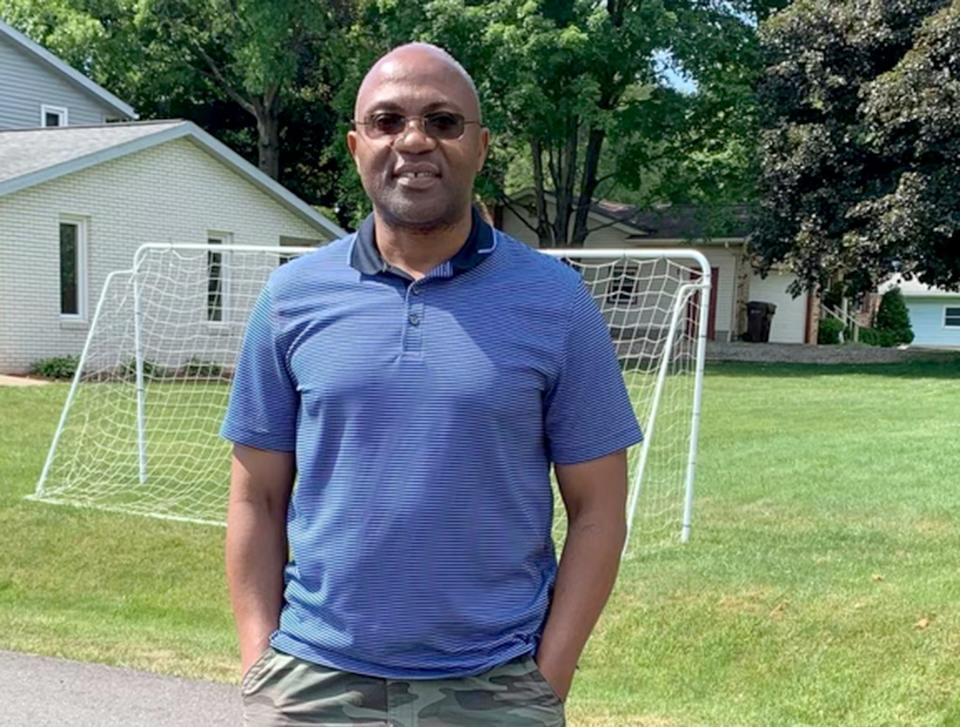
Kerns was lead counsel in 2009 for Lazare Kobagaya. It was the nation's first example where the U.S. government tried to prove Rwandan genocide to gain conviction on immigration crimes.
A then-84-year-old Kobagaya was convicted in 2011 on a single crime. Like Nshimiye, he came to the attention of U.S. authorities after he gave a deposition on behalf of a former Rwandan pastor who was later sentenced to life in prison by a Finnish court.
During Kobagaya's trial, Kerns contended that testimony from impoverished Rwandan witnesses against his client was tainted, according to a CBS News report at the time.
"And you wonder why our country is in debt? It is because it is paying off killers in Rwanda," Kerns told jurors during closing arguments.
Chantal Nshimiye said the government is wrong about her husband.
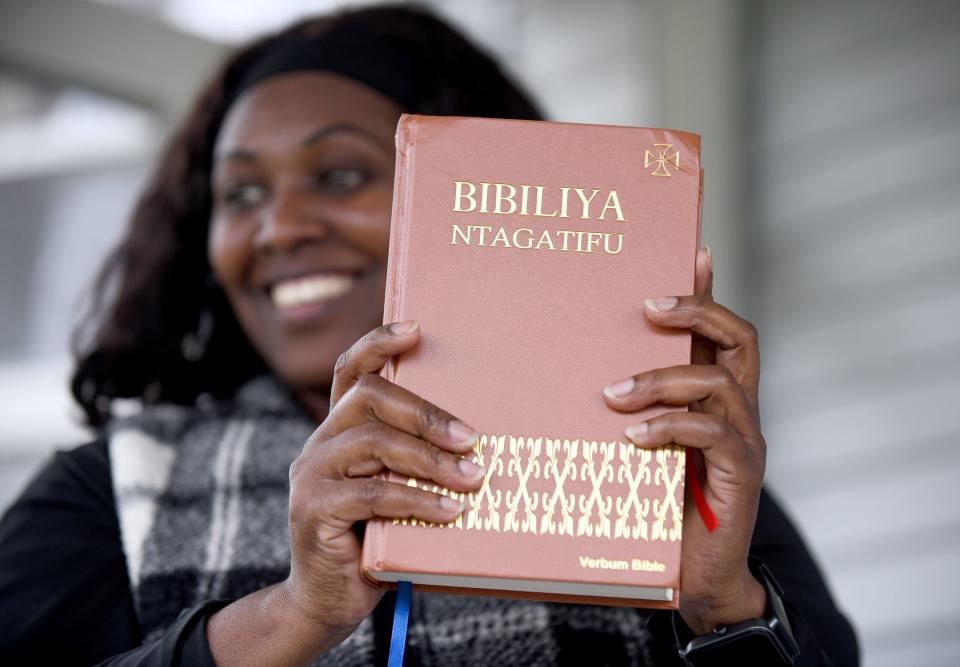
"We don't know who is saying these things," she said. "But we want to face them. Eric will not run away."
In a court filing Tuesday, the attorneys wrote that they will assess what the Nshimiye family can afford to pay and whether federal Criminal Justice Act funds are needed to supplement a defense.
"Considering the nature of the prosecution, defense counsel anticipates the necessity for an investigation in Rwanda and the potential need for foreign depositions and/or witnesses," they wrote, noting that $350,000 in CJA funds were spent in the Kobagaya case.
Chantal Nshimiye said she believes in justice. She said anyone who killed innocent Tutsis belongs in prison. But she also believes her husband will be back home.
She believes ― for so many reasons.
Reach Tim at 330-580-8333 or tim.botos@cantonrep.com.On X: @tbotosREP
This article originally appeared on The Repository: Eric Nshimiye's family relies on faith amid genocide accusations

